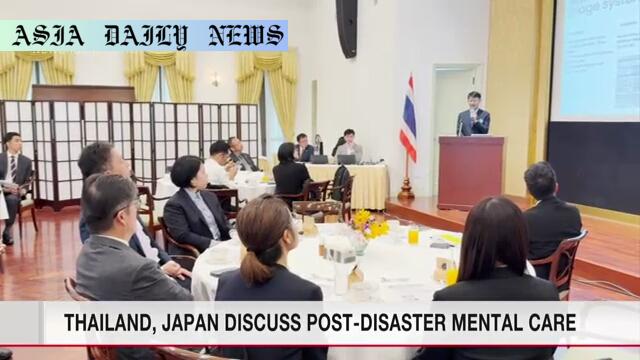Mental Health: Japanese experts collaborate with Thailand to enhance post-disaster care for victims, families, and first responders.
Mental Health care support discussed in Thailand after disaster.
Japanese experts shared strategies focusing on survivors and first responders.
Acknowledged the need for enhancing psychological programs.

Addressing the Critical Need for Post-Disaster Mental Health Support
The necessity of mental health care after catastrophic events cannot be overstated, as evidenced by recent collaborations between Thailand and Japan. Following the collapse of a high-rise building in Bangkok caused by a massive earthquake in central Myanmar, the importance of psychological care for disaster survivors, bereaved families, and first responders has come into sharp focus. The tragedy claimed 89 lives, left 9 injured, and rendered 7 individuals missing – a wake-up call for systemic gaps in dealing with trauma.
In an insightful meeting held in Thailand, mental health experts from Japan shared their experiences in providing long-term psychological assistance. This event, attended by over 30 participants, featured valuable contributions from Kato Hiroshi, the director of the Hyogo Institute for Traumatic Stress, whose expertise stems from decades of support for survivors of Japan’s 1995 Great Hanshin-Awaji Earthquake. Kato emphasized that survivors often experience a mix of guilt and fear, hesitating to voice their internal struggles when surrounded by loss and grief. He also brought to light a commonly overlooked aspect – the mental health of first responders like firefighters and police officers, who operate tirelessly under immense emotional and physical strain.
Thai health official Pongsakorn Lengdee acknowledged these gaps in local mental health programs, emphasizing the need for forward-thinking initiatives to prioritize this aspect of disaster management. He expressed intent to initiate meaningful discussions with his colleagues on developing comprehensive systems aimed at supporting not only the victims but also the heroic rescuers who work at the frontline.
Drawing Lessons from Cross-Cultural Expertise
Japan’s valuable insights derive from years of structured responses to natural disasters which incorporate mental health as a cornerstone in recovery. Kato Hiroshi’s presentation underlined the need for empathy, professional support, and timely interventions to help affected populations rebuild their lives. Cultural nuances were also addressed, with speakers ensuring that strategies recognized socio-cultural differences between the two countries. Advocacy for public mental health awareness campaigns and targeted therapy sessions were key highlights of the meeting.
The role of educating and training first responders on mental health resilience emerged as a vital takeaway for Thai health authorities. Building stronger support networks for first responders ensures they are mentally prepared to face challenges post-disaster and prevents long-term mental health conditions such as PTSD.
Additionally, collaborative projects involving both nations were proposed to implement advanced psychological care models. These discussions serve as a foundation for future developments in disaster relief frameworks that go beyond physical rehabilitation and into emotional well-being.
A Way Forward for Thailand and Beyond
Looking ahead, this interactive session between Thailand and Japan signals a promising step towards enhancing mental health care mechanisms in disaster situations. While immediate concerns like rescue operations and medical help take priority, this dialogue stresses the equal import of long-term mental care that sustains individuals and communities over time. Thai officials are reportedly keen to establish programs that apply the knowledge shared by Japan, potentially adapting these methods into localized frameworks tailored to Thai dynamics.
Systematic awareness campaigns targeting the public at large, in addition to specific resources for affected families and responders, might play a crucial role in normalizing mental health care post-disaster. Leveraging technology and trained professionals, this collaborative relationship could also establish best practices for other nations with similar vulnerability profiles.
Commentary
The Overlooked Aspect of Mental Health in Disasters
The exchange between Thailand and Japan marks a moment of reflection on the often-neglected facet of disaster recovery: mental health care. While immediate physical relief often dominates disaster response efforts, the significance of addressing long-term emotional scars is coming to light. Japan’s involvement in sharing its experiences has provided Thailand with actionable insights, laying the groundwork for meaningful change in the realm of mental health.
A particularly striking element from this discourse is the acknowledgement of first responders’ mental health needs. These unsung heroes bear witness to unparalleled destruction and anguish, yet their emotional struggles remain in the shadows of operational demands. The initiative to include rescue workers in psychological care programs signifies an evolution in disaster management, one that humanizes all stakeholders involved – from survivors to rescuers.
Building Resilience Through Cross-Cultural Exchange
The collaborative nature of this event also underscores the importance of cross-border learning. Japan’s well-documented history of resilience in the face of frequent natural calamities makes it a valuable partner for Southeast Asian countries, including Thailand. It is heartening to see how global dialogues can translate into shared knowledge, transforming disaster recovery narratives into more inclusive and sustainable ones.
Ultimately, the efforts showcased here provide a model for countries worldwide to emulate. By addressing both visible and invisible injuries with equal weight, nations can propel their disaster management strategies into progressive territory. This exchange between Thailand and Japan is not just about sharing knowledge—it is about fostering a culture that values healing, empathy, and an unyielding commitment to humanity.


